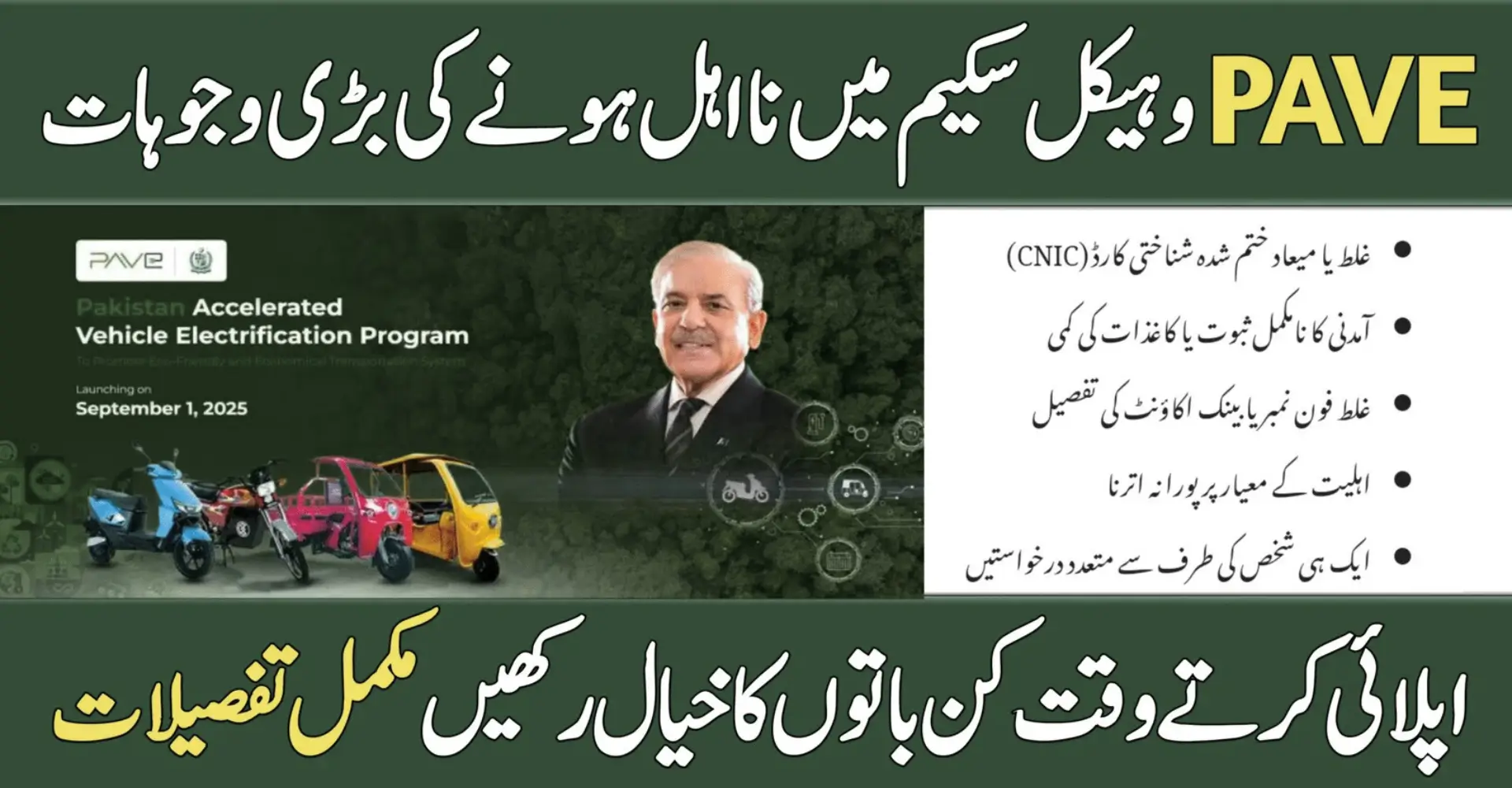Breaking News: Rejected from PAVE Vehicle Scheme? Here’s What Went Wrong & How to Reapply (2025)

Breaking News: Rejected from PAVE Vehicle Scheme? Here’s What Went Wrong & How to Reapply (2025). The PAVE Vehicle Scheme 2025 has become a major opportunity for thousands of Pakistanis seeking electric bikes, rickshaws, and loaders under easy installments. But not everyone got lucky many applicants received rejection messages.
If you’re wondering why your PAVE application was rejected and how to reapply correctly, this article breaks down every detail to help you fix mistakes and boost your chances in the next phase.
Understanding the PAVE Vehicle Scheme 2025
Before finding out why you were rejected, it’s essential to understand what the PAVE (Pakistan Accelerated Vehicle Electrification) Scheme really offers.
| Category | Details |
|---|---|
| Program Name | PAVE Vehicle Scheme 2025 |
| Vehicle Options | Electric Bikes, Rickshaws, Loaders |
| Target Groups | Students, Low-Income Families, Daily Wage Workers |
| Installment Plan | Easy Monthly Installments |
| Registration Mode | Online via PAVE Portal |
| Support Helpline | PAVE Complaint Portal & Call Center |
The scheme supports Pakistan’s green energy vision and aims to help low-income families transition to electric mobility.
Main Reasons for Rejection in PAVE Vehicle Scheme 2025
Despite good intentions, thousands of applications were rejected due to technical or eligibility issues. Let’s look at the most common reasons so you can avoid them in the next phase.
1. Incomplete or Incorrect Application
Many applicants left blank fields or entered wrong details such as CNIC numbers or addresses. The automated verification system immediately flags incomplete data.
Tip: Fill in every required field carefully and double-check spelling before submitting.
2. Invalid or Expired CNIC
If your CNIC is expired, blocked, or not updated in NADRA, your form will automatically be rejected.
Tip: Visit a NADRA center or update your CNIC information online before reapplying.
3. Eligibility Criteria Not Met
The PAVE Scheme 2025 targets students, workers, and low-income families. If your declared monthly income exceeds the set limit, your application will be denied.
Tip: Always provide genuine income proof, and don’t overstate your financial capacity.
4. Duplicate or Multiple Applications
Some users submit multiple forms using the same CNIC or different mobile numbers. This triggers the system’s fraud detection and leads to automatic rejection.
Tip: Only one clean, verified submission per CNIC is allowed.
5. Fake or Unclear Documents
Unverified, blurred, or fake documents (such as income certificates, licenses, or utility bills) are among the biggest reasons for rejection.
Tip: Upload scanned documents in clear PDF or JPEG format, with all edges visible.
6. Technical or Server Errors
At times, heavy traffic on the PAVE registration portal causes technical glitches, resulting in failed submissions or incomplete uploads.
Tip: Always apply during non-peak hours (early morning or late evening) and ensure a stable internet connection.
Who Is Eligible — and Who Is Not
To make things clear, here’s a quick eligibility comparison:
| Eligible Applicants | Not Eligible Applicants |
|---|---|
| Students with valid CNIC | Individuals with blocked or expired CNIC |
| Low-income families | High-income earners above set limit |
| Daily wage workers, delivery riders | Applicants with incomplete or multiple forms |
| Persons with disabilities | Those using fake or unclear documents |
Expert Insight: The government’s primary focus is inclusivity — so the preference is for applicants genuinely needing financial and mobility support.
Common Mistakes to Avoid Before Reapplying
Rejections are common, but the good news is you can still apply again in PAVE Scheme Phase 2. Here’s how to make sure you don’t repeat the same errors:
- Check CNIC Validity: Ensure your ID is active and correctly updated.
- Provide All Information: Never leave a field blank, even if optional.
- Use Real Documents: Upload genuine papers with official stamps.
- Avoid Duplicate Submissions: Submit once, correctly.
- Attach Income Proof: Salary slips, shop receipts, or self-employment certificates.
- Meet Deadlines: Late entries are not accepted under any condition.
How to Reapply for the PAVE Vehicle Scheme (Phase 2)
If you’ve been rejected, don’t worry — the next phase gives you a second chance. Follow these reapplication steps carefully:
Step 1: Visit the Official Portal
Go to www.pave.gov.pk (official PAVE website). Always avoid fake pages or social media links.
Step 2: Create or Log Into Your Account
Use your CNIC and mobile number to sign up or log in to your previous account.
Step 3: Fill Out the Application Form
Provide:
- Personal information
- CNIC number
- Monthly income
- Occupation category (student, worker, delivery rider, etc.)
- Desired vehicle type (bike, rickshaw, loader)
Step 4: Upload Verified Documents
Upload:
- CNIC (front and back)
- Proof of income or student card
- Recent utility bill
- Passport-size photo
Step 5: Submit and Get Confirmation
Once submitted, you’ll receive an acknowledgment SMS or email. Keep this for reference.
PAVE Complaint Portal – How to Appeal a Rejected Application
If your application was wrongly rejected, you can now appeal online via the PAVE Complaint Portal 2025.
How to File a Complaint:
- Go to the official Complaint Portal.
- Enter your CNIC and rejection reference number.
- Describe your issue clearly.
- Upload supporting documents (corrected CNIC, income slip, etc.).
- Submit and track the complaint status online.
Helpline Support:
You can also contact the PAVE Call Center for live assistance and case follow-ups.
Why Rejections Are Common — Data Snapshot
Recent reports indicate that over 35% of applicants were rejected during the PAVE Vehicle Scheme 2025 Phase 1, mainly due to incomplete documentation or invalid IDs.
| Rejection Cause | Approx. Percentage |
|---|---|
| Incomplete Forms | 30% |
| Invalid CNIC | 20% |
| Duplicate Applications | 15% |
| Fake/Unclear Documents | 25% |
| Technical Errors | 10% |
Insight: The government is improving its digital verification system to reduce these rejections in Phase 2.
Benefits of the PAVE Scheme (If You’re Approved)
If your reapplication succeeds, here’s what you can expect:
- Affordable EV Ownership: Easy monthly installments for e-bikes, rickshaws, and loaders.
- Green Pakistan Initiative: Contributes to reduced fuel emissions.
- Empowerment: Helps youth, workers, and students earn through delivery and transport jobs.
- Digital Transparency: Online verification ensures fair selection.
Upcoming PAVE Vehicle Scheme 2025 Phase 2 Updates
According to government insiders, the Phase 2 registration will start soon with simplified procedures and error-free digital verification.
Applicants will receive:
- SMS notifications about reapplication dates.
- Improved portal design with real-time tracking.
- Direct bank verification to minimize document fraud.
Tip: Keep your documents ready and follow the official updates on pave.gov.pk or verified news portals.
FAQs About PAVE Vehicle Scheme 2025
Q1. Why are people rejected for the PAVE Vehicle Scheme 2025?
Most rejections are due to incomplete information, invalid CNICs, fake documents, or multiple applications.
Q2. Can I reapply after being rejected?
Yes. The government has confirmed that rejected applicants can reapply in Phase 2 after correcting errors.
Q3. How can I check my PAVE application status?
Visit pave.gov.pk and log in using your CNIC to check real-time status updates.
Q4. What documents are required for reapplication?
You’ll need your CNIC, income proof, utility bill, and photo ID.
Q5. Where can I submit a complaint about rejection?
Use the PAVE Complaint Portal 2025 to submit an appeal and track it online.
Conclusion
Getting rejected from the PAVE Vehicle Scheme 2025 can be disappointing — but it’s not the end. The rejection often results from simple errors or missing documents, not from disqualification.
Before reapplying, double-check your CNIC, fill every detail accurately, and use genuine documents. The upcoming PAVE Phase 2 will give you another chance to benefit from this eco-friendly, government-backed initiative.














